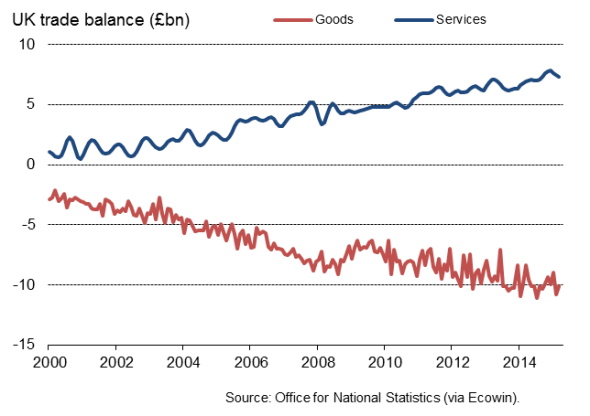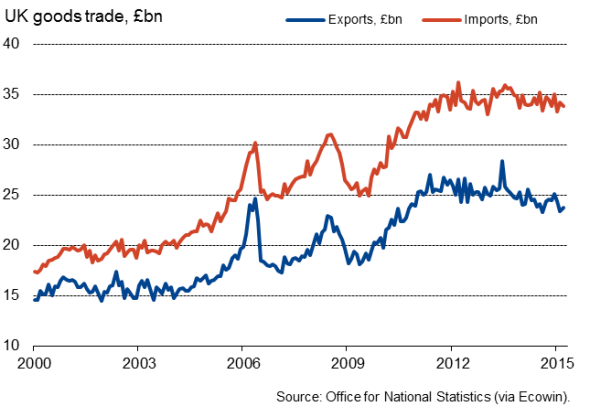Customer Logins
Obtain the data you need to make the most informed decisions by accessing our extensive portfolio of information, analytics, and expertise. Sign in to the product or service center of your choice.
Customer Logins
ECONOMICS COMMENTARY
May 08, 2015
UK trade balance worsens in first quarter
The challenge facing the new government of boosting UK trade and rebalancing the economy is highlighted by a timely reminder of a further widening of the goods deficit in the first quarter.
The goods deficit in the first three months of the year ballooned to "29.9bn, according to data from the Office for National Statistics, up from "29.1bn in the final quarter of last year and close to the all-time high of "31.5bn seen in the third quarter of last year.
If services are included, the deficit jumped from "6.0bn at the end of last year to "7.5bn in the first quarter.
Exports rose for the first time in three months in March - a 0.7% increase driven by a 1.4% rise in goods exports - but over the first quarter as a whole exports were down 2.3% on the final quarter of last year. Goods exports slumped some 3.6%. Goods imports were meanwhile down 1.9% in the first quarter.
More pain in sight
Unfortunately the March improvement in exports does not look like the start of an upward trend, as more export pain is signalled for April. Like the official data, the PMI survey data had signalled a brief resumption of export growth in March, but have since shown a renewed decline at the start of the second quarter, registering the steepest fall since January 2013. Companies reported that the strong pound is hitting competitiveness in export markets - something which the post-election rally in sterling looks set to exacerbate, assuming the appreciation is sustained.
The trade data corroborate the GDP numbers, which showed the pace of economic growth weakening in the first quarter. As such, the data are a salient reminder of how policy needs to be guided towards boosting exports, and how in the absence of stronger manufacturing and export sectors, the UK economy remains worryingly dependent on the domestic consumer.
UK trade

UK goods imports and exports

Chris Williamson | Chief Business Economist, IHS Markit
Tel: +44 20 7260 2329
chris.williamson@ihsmarkit.com
{"items" : [
{"name":"share","enabled":true,"desc":"<strong>Share</strong>","mobdesc":"Share","options":[ {"name":"facebook","url":"https://www.facebook.com/sharer.php?u=http%3a%2f%2fwww.spglobal.com%2fmarketintelligence%2fen%2fmi%2fresearch-analysis%2f08052015-economics-uk-trade-balance-worsens-in-first-quarter.html","enabled":true},{"name":"twitter","url":"https://twitter.com/intent/tweet?url=http%3a%2f%2fwww.spglobal.com%2fmarketintelligence%2fen%2fmi%2fresearch-analysis%2f08052015-economics-uk-trade-balance-worsens-in-first-quarter.html&text=UK+trade+balance+worsens+in+first+quarter","enabled":true},{"name":"linkedin","url":"https://www.linkedin.com/sharing/share-offsite/?url=http%3a%2f%2fwww.spglobal.com%2fmarketintelligence%2fen%2fmi%2fresearch-analysis%2f08052015-economics-uk-trade-balance-worsens-in-first-quarter.html","enabled":true},{"name":"email","url":"?subject=UK trade balance worsens in first quarter&body=http%3a%2f%2fwww.spglobal.com%2fmarketintelligence%2fen%2fmi%2fresearch-analysis%2f08052015-economics-uk-trade-balance-worsens-in-first-quarter.html","enabled":true},{"name":"whatsapp","url":"https://api.whatsapp.com/send?text=UK+trade+balance+worsens+in+first+quarter http%3a%2f%2fwww.spglobal.com%2fmarketintelligence%2fen%2fmi%2fresearch-analysis%2f08052015-economics-uk-trade-balance-worsens-in-first-quarter.html","enabled":true}]}, {"name":"rtt","enabled":true,"mobdesc":"Top"}
]}



